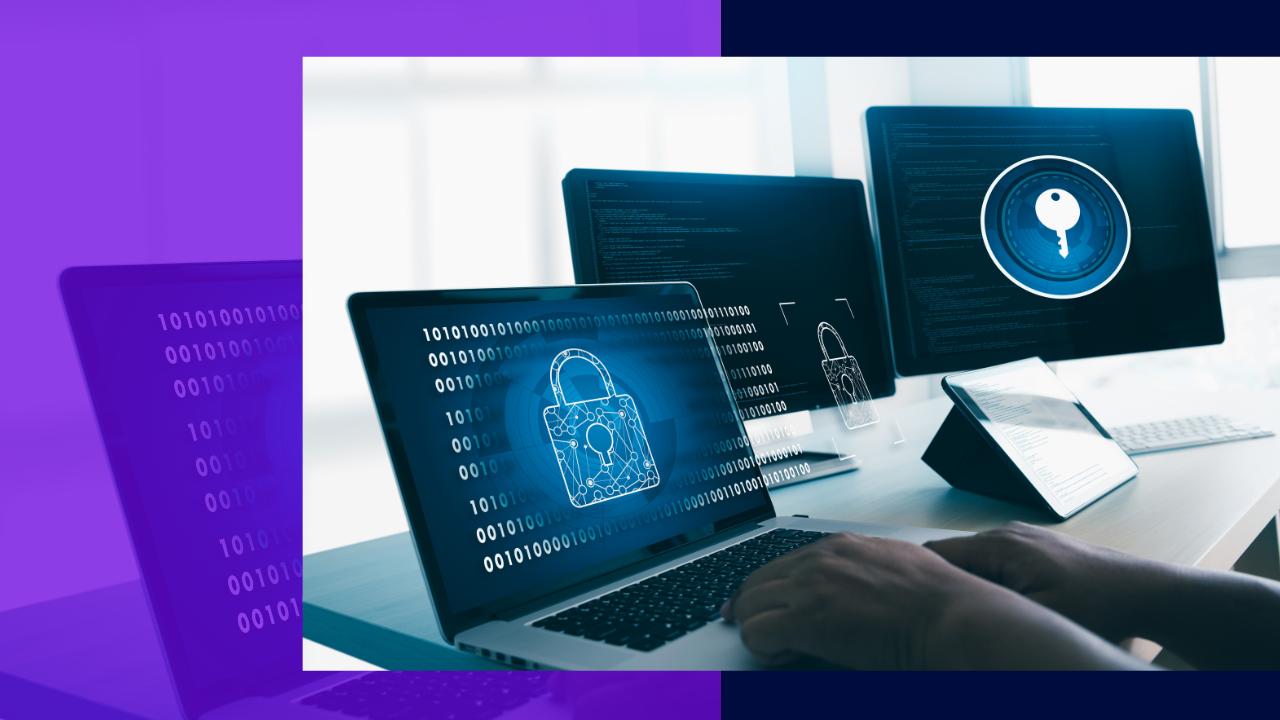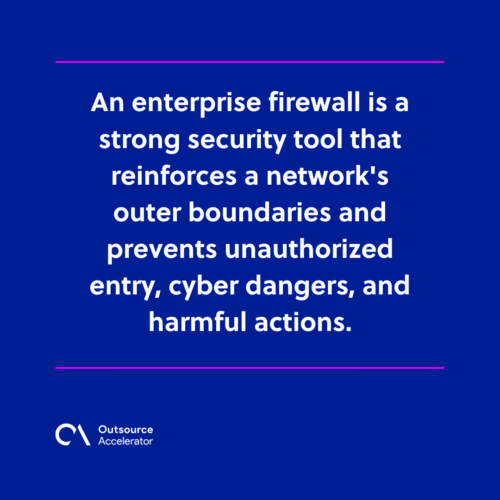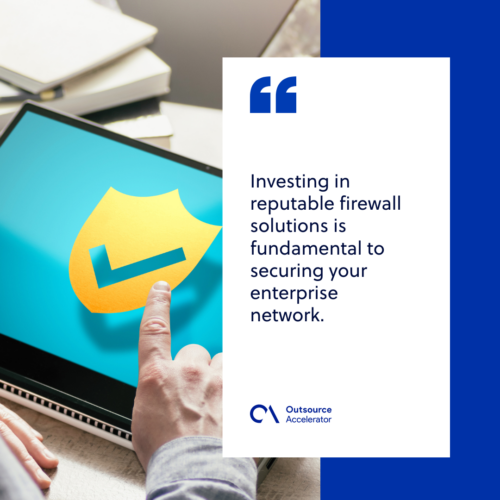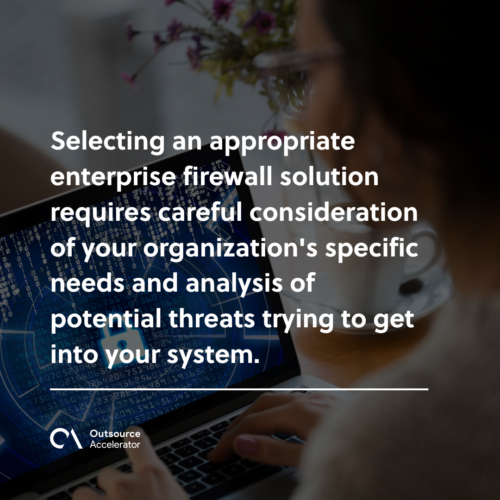Digital ramparts: An in-depth guide to enterprise firewall

The vast amount of information stored, processed, and transmitted by businesses holds immense value—not only for organizations but also for threat actors with malicious intent.
Failure to comply with these regulations can lead to hefty fines and legal penalties, tarnishing a company’s financial health and reputation.
Companies that handle customer data have a moral and legal obligation to safeguard that information. Maintaining customer trust is paramount for long-term success.
97% of businesses say they want to raise their expenditure on safeguarding customer data, indicating that companies are starting to feel the effects of this trend toward data protection. One of the cornerstone elements of cybersecurity is the enterprise firewall.
Defining enterprise firewall
An enterprise firewall is a strong security tool that reinforces a network’s outer boundaries and prevents unauthorized entry, cyber dangers, and harmful actions. It acts like a virtual wall, managing incoming and outgoing data flow in line with preset security guidelines.
In other words, an enterprise firewall watches over incoming data parcels, checking if they match the set standards. It also serves as a digital guardian, ensuring only safe and approved data can enter or exit the network, shielding it from any threat actor.

Types of enterprise firewalls
Here are the significant types of enterprise firewalls:
Network firewall
A network firewall, often called a traditional or packet-filtering firewall, operates at the network layer. It evaluates incoming traffic based on predefined rules, allowing or blocking data packets based on factors such as:
- Source and destination of data
- IP addresses
- Port numbers
- Protocols
However, while this type of enterprise firewall is effective for basic security, network firewalls have limitations in dealing with more sophisticated threats.
Application firewall
An application enterprise firewall, or a proxy firewall, operates at a higher level. It takes a closer look at the data’s content and context to ensure it aligns with the specific requirements of the applications.
This enterprise firewall offers a finer level of control over traffic, making it particularly adept at detecting and halting application-specific vulnerabilities.
Just like a specialized security guard, it understands the nuances of various applications and can take immediate action if it detects any irregularities.
Next-generation firewall
Next-generation firewalls (NGFWs) take a step beyond traditional approaches by merging the best security systems—traditional firewalls and intrusion prevention systems.
These advanced guardians assess packet headers like their predecessors and dive deeper into packet payloads, analyzing the actual data within the packets.
This technique, known as deep packet inspection, allows NGFWs to identify potential threats that could escape the notice of traditional firewalls.
With intrusion detection and application awareness features, NGFWs provide a comprehensive security solution that adapts to the evolving threat landscape.
How an enterprise firewall safeguards networks
Like a skilled strategist, an enterprise firewall employs various tactics to shield your network from harm. It also filters incoming and outgoing traffic to inspect data packets (network packets) for anomalies.
Remember that not all firewalls are created equal. Opting for trusted digital firewall solutions can make a difference.
Trusted digital firewall solutions
Investing in reputable firewall solutions is fundamental to securing your enterprise network. Well-established firewall vendors offer comprehensive protection, regular updates, and prompt response to emerging threats.
Here are five reputable enterprise firewall providers:
- Cisco Systems – This enterprise firewall provider offers a range of enterprise firewalls with advanced threat protection, intrusion prevention, and application visibility and control.
- Palo Alto Networks – Renowned for its next-generation firewall solutions, Palo Alto Networks offers advanced features such as application-based policies, user identification, and threat prevention.
- Fortinet – It provides various security solutions, including enterprise firewalls, integrating features like intrusion prevention, application control, and SSL inspection.
- Check Point Software Technologies – This provider is recognized for its comprehensive firewall solutions that cover network security, intrusion prevention, and threat intelligence.
- Juniper Networks – It offers enterprise firewalls focusing on performance and scalability. Juniper Networks’ solutions provide application visibility, user-based access control, and protection against advanced threats.
By partnering with trusted enterprise firewall providers, you can ensure that your firewall remains robust and adaptive in the face of evolving cybersecurity threats.

Components of an effective enterprise firewall
The effectiveness of an enterprise firewall relies on its components, each playing a distinct role in the defense mechanism.
Packet filtering
Packet filtering involves evaluating data packets based on predefined rules. Although this enterprise firewall component is quick and efficient, it cannot thoroughly inspect packet contents, making it susceptible to certain cyber attacks.
Stateful inspection
This enterprise firewall component maintains a record of active connections and examines packets’ state to determine whether they’re part of an established authorized connection.
It offers better security than packet filtering by ensuring that only valid traffic is permitted.
Deep packet inspection
Deep packet inspection (DPI) involves thoroughly analyzing packet contents. It enables firewalls to identify and block malicious content, even if concealed within legitimate-looking data.
Application layer filtering
Application layer filtering focuses on the content and behavior of network traffic at the application layer. By understanding the context of traffic, this enterprise firewall component can detect and prevent attacks that traditional firewalls might miss.
Intrusion detection and prevention systems (IDPS)
Integrated into some modern firewalls, IDPS monitors network traffic for signs of potential intrusions. This enterprise firewall component can detect and respond to anomalous activities, providing an additional layer of security.
Choose the right enterprise firewall solution for your firm
Selecting an appropriate enterprise firewall solution requires careful consideration of your organization’s specific needs and analysis of potential threats trying to get into your system.

Whether you opt for a traditional network firewall, an application-focused solution, or a next-generation firewall, understanding the nuances of each type and its components is essential.
Conduct a thorough assessment of your network’s architecture, the sensitivity of your data, and the types of applications you rely on.
By aligning your choice with your unique requirements, you can establish a robust security posture that safeguards your digital assets against an evolving landscape of cyber threats.







 Independent
Independent




